In 2000, the National Academies Press released From Neurons to Neighborhoods: The Science of Child Development, spotlighting the importance of early childhood development and education. In addition to explaining how important the early years are to human development, this seminal report presented research showing, among other factors, how positive back-and-forth interactions between an adult and a child set the foundation for the child’s growth and development.
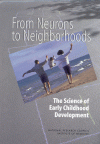
Jack P. Shonkoff and Deborah A. Phillips, eds., From Neurons to Neighborhoods: The Science of Early Childhood Development (Washington, DC: National Academies Press, 2000).
In 2015, the National Academies Press released Transforming the Workforce for Children Birth Through Age 8: A Unifying Foundation, which details why the early childhood workforce must be supported and strengthened to better provide children with the type of interactions that best support their development. Working with young children is complex work and requires specialized knowledge and skills. This report explains what high-quality instruction and care should look like and recommends how to get there. The report also says that being able to build relationships with families is a key competency for the early education workforce.
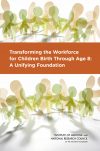
LaRue Allen and Bridget B. Kelly, eds., Transforming the Workforce for Children Birth Through Age 8: A Unifying Foundation (Washington, DC: National Academies Press, 2015).
In October 2013, the Society for Research in Child Development and the Foundation for Child Development released Investing in Our Future: The Evidence Base on Preschool Education, a paper by leading experts in early childhood that compiled the evidence on the benefits of high-quality pre-K. They concluded that factors that improve classroom conditions, such as small adult-to-child ratios, “by themselves are not enough.” Instead, they write, the most important aspects of quality are determined by relationships and interactions between adults and children. Interactions related to learning are associated with positive gains for children, as are interactions that foster warm and positive relationships. For example, by engaging in back-and-forth dialogue with children, educators encourage children to elaborate and build language skills.
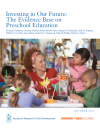
Hirokazu Yoshikawa, Christina Weiland, Jeanne Brooks-Gunn, Margaret R. Burchinal, Linda M. Espinosa, William T. Gormley, Jens Ludwig, Katherine A. Magnuson, Deborah Phillips, and Martha J. Zaslow, Investing in Our Future: The Evidence Base on Preschool Education (New York: Foundation for Child Development, 2013). Available at https://www.fcd-us.org/the-evidence-base-on-preschool/.
The National Association for the Education of Young Children (NAEYC) has released a position statement presenting a framework for developmentally appropriate practice for early childhood education programs serving children from birth through age 8. It includes an emphasis on the importance of “conversation between child and adult on a given topic sustained over many exchanges,” and states that, “it is the teacher’s classroom plans and organization, sensitivity and responsiveness to all the children, and moment-to-moment interactions with them that have the greatest impact on children’s development and learning.” The statement goes on to say that “the way teachers design learning experiences, how they engage children and respond to them, how they adapt their teaching and interactions to children’s background, the feedback they give—these matter greatly in children’s learning.”
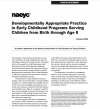
Developmentally Appropriate Practice in Early Childhood Programs Serving Children from Birth Through 8: A Position Statement of the National Association for the Education of Young Children (Washington, DC: NAEYC, 2009).
Available at
https://www.naeyc.org/sites/default/files/globally-shared/downloads/PDFs/resources/position-statements/PSDAP.pdf.
A 2008 study of 2,800 randomly selected pre-kindergartners participating in state-funded pre-K programs found that academic gains were associated with the quality of instruction and close teacher-child relationships. Another 2008 study of 2,439 pre-kindergartners across 11 states found that “teachers’ instructional interactions predicted academic and language skills and teachers’ emotional interactions predicted teacher-reported social skills.”
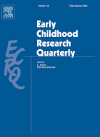
Carollee Howes, Margaret Burchinal, Robert Pianta, Donna Bryant, Diane Early, Richard Clifford, and Oscar Barbarin, “Ready to Learn? Children’s Pre-Academic Achievement in Pre-Kindergarten Programs,” Early Childhood Research Quarterly 23, no. 1 (2008): 27–50.

Andrew J. Mashburn, Robert C. Pianta, Bridget K. Hamre, Jason T. Downer, Oscar A. Barbarin, Donna Bryant, Margaret Burchinal, Diane M. Early, and Carollee Howes, “Measures of Classroom Quality in Prekindergarten and Children’s Development of Academic, Language and Social Skills,” Child Development 79 (May/June 2008): 732–749.
In 2007, Harvard’s Center on the Developing Child released A Science-Based Framework for Early Childhood Policy, which takes a comprehensive look at the research on the practices that best support healthy child development, identifies “a language-rich environment” and “warm, responsive interactions between staff and children” as two of the five key components of effective early care and education programs.
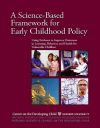
Harvard’s Center on the Developing Child, A Science-Based Framework for Early Childhood Policy: Using Evidence to Improve Outcomes in Learning, Behavior and Health for Vulnerable Children (Cambridge, MA: Center on the Developing Child, 2007).
In 2016, the National Academies Press released Parenting Matters: Supporting Parents of Children 0-8, a consensus report on how parents can support the development of young children. As children’s first teachers and most important teachers, parents or guardians play a critical role in their learning. The report recommends equipping the early education workforce to support and engage parents.
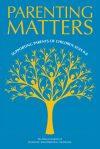
Vivian L. Gadsden, Morgan Ford, and Heather Breiner, Parenting Matters: Supporting Parents of Children Ages 0–8 (Washington, DC: National Academies Press, 2016). Available at https://doi.org/10.17226/21868.
Engaging with parents means that pre-K educators should see parents and other family members as partners in helping to support children’s learning. This requires working to understand the parents’ perspective and recognize a family’s strengths. A 2017 report by the National Black Child Development Institute and the Center for Law and Social Policy, which focuses on child care but has lessons for pre-K providers as well, explains that “engaging with parents is critical for teachers to fully grasp the social and cultural context of young children.” It adds: “early learning providers should learn dynamic ways to respond to the unique needs of parents/caregivers and children instead of having a stagnant strategy for engaging with parents.” Studies and theories from Luis C. Moll, author of numerous education-focused studies on families, have gained currency as positive approaches for understanding the households that children are living in.
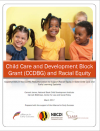
Cemeré James and Hannah Matthews, Child Care and Development Block Grant (CCDBG) and Racial Equity (Washington, DC: National Black Child Development Institute and Center for Law and Social Policy, 2017). Available at https://www.nbcdi.org/sites/default/files/resource-files/NBCDI_CLASP%20Policy%20Brief%20CCDBG%20and%20Racial%20Equity.pdf.
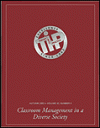
Luis C. Moll, Cathy Amanti, Deborah Neff, and Norma Gonzalez, “Funds of Knowledge for Teaching: Using a Qualitative Approach to Connect Homes and Classrooms,” Theory Into Practice 31 (Spring 1992): 132–141. Available at https://www.jstor.org/stable/1476399?seq=1#page_scan_tab_contents.
This 2009 paper by experts at the National Association for the Education of Young Children and an advocacy organization called Pre-K Now reviews the research on the relationship between early education program partnerships with families and child success. It finds family-program connections to be associated with “greater academic motivation, grade promotion, and socio-emotional skills across all young children.” The authors offer a comprehensive definition for family engagement and emphasize the importance of considering the needs of diverse families.
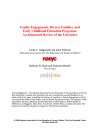
Linda C. Halgunseth, Amy Peterson, Deborah R. Stark, and Shannon Moodie, Family Engagement, Diverse Families, and Early Childhood Education Programs: An Integrated Review of the Literature (Washington, DC: NAEYC, 2009).
A 2002 literature review by Anne Henderson and Karen Mapp analyzes the numerous studies on the role of parent and community involvement in student achievement. The report includes multiple studies on early childhood education and spans up through the high school years. They find that parent involvement is strongly associated with student success. In 2013, Karen Mapp and Paul J. Kuttner released a framework for designing family engagement initiatives that bring educators and families together to support student success.
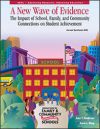
Anne T. Henderson and Karen L. Mapp, A New Wave of Evidence: The Impact of School, Family, and Community Connections on Student Achievement (Austin: Southwest Educational Development Laboratory, 2002).
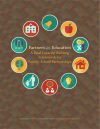
Karen L. Mapp and Paul J. Kuttner, Partners in Education: A Dual Capacity-Building Framework for Family-School Partnerships (Austin: Southwest Educational Development Laboratory, 2013).
This report by MDRC on family involvement summarizes approximately 10 years of research on how family involvement in young children’s learning and development affects their literacy, mathematics, and social-emotional skills. Efforts to boost parent involvement are important because children usually do better when parents are more engaged.
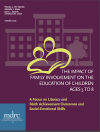
Frances L. Van Voorhis, Michelle Maier, Joyce L. Epstein, Chrishana M. Lloyd, and Therese Leung, The Impact of Family Involvement on the Education of Children Ages 3 to 8: A Focus on Literacy and Math Achievement Outcomes and Social-Emotional Skills (New York: MDRC, 2013).